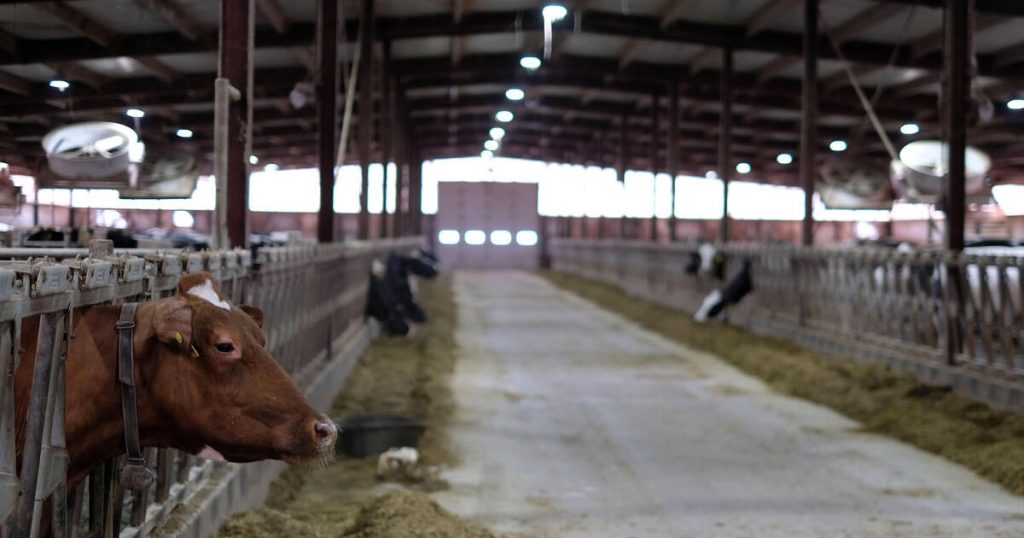In Waumandee, Wisconsin, a significant portion of the local dairy industry relies on immigrant labor, especially undocumented migrants. A report by the University of Wisconsin-Madison has highlighted that over 10,000 undocumented workers play a crucial role in Wisconsin’s dairy operations. The story of Kevin, a young worker who left central Mexico for a better life in the U.S., highlights both the challenges and contributions of these workers to the economy. As political pressures grow surrounding immigration reform, both farmers and workers face uncertain futures.
| Article Subheadings |
|---|
| 1) Immigrant Labor’s Role in Dairy Farming |
| 2) The Experience of Undocumented Workers |
| 3) Economic Implications for Farmers |
| 4) The Changing Immigration Landscape |
| 5) Future Considerations for the Dairy Industry |
Immigrant Labor’s Role in Dairy Farming
The dairy farming industry in Wisconsin is heavily dependent on immigrant labor, with a significant number of workers being undocumented migrants. According to recent statistics, immigrants make up more than half of the workforce in the U.S. dairy sector. This reliance on immigrant workers raises questions about the sustainability of the industry, particularly in light of changing immigration policies. The current situation highlights the vital need for labor in dairy farms as these farms face challenges with staffing and maintaining productivity.
The Experience of Undocumented Workers
The story of Kevin, a 21-year-old dairy worker, sheds light on the daily lives and struggles faced by undocumented immigrants in the agricultural sector. Having crossed the U.S. southern border at the age of 18, Kevin now dedicates his life to contributing to the dairy industry, often working grueling 12-hour shifts, six days a week. His responsibilities include essential tasks such as feeding cows and cleaning barns. While the work is demanding, Kevin values the opportunity to provide for his family back in Mexico, sending vital remittances home to support his mother and siblings.
Economic Implications for Farmers
Farmers like John Rosenow face significant challenges in assuaging the potential impacts of stricter immigration policies on their operations. Rosenow, who owns over 900 acres and more than 600 dairy cows, states that hiring American workers would drastically increase labor costs, which could lead to unsustainable business practices. He estimates that he would need to pay around $100,000 annually per worker, which is an unreasonable figure compared to what he currently pays his immigrant employees. This economic reality creates a precarious situation for farmers who rely on affordable labor to maintain their operations and profitability.
The Changing Immigration Landscape
With the political landscape shifting, many farmers are increasingly concerned about the future of their workforce. The Trump administration’s focus on stricter immigration enforcement has raised fears among farmers about losing their staff, should they be deported. Rosenow expressed this concern clearly, stating, “I’m out of business. And it wouldn’t take long.” This statement underscores the urgency for legislative reforms that could provide pathways for undocumented immigrants to secure their status while maintaining their contributions to the labor force.
Future Considerations for the Dairy Industry
As discussions surrounding immigration continue, the future of the dairy industry and its reliance on immigrant labor remains uncertain. The experiences of workers like Kevin indicate that, despite fears, many have found ways to adapt to their circumstances. With a strenuous work ethic and a commitment to supporting their families, they navigate their roles in the workforce while dealing with anxiety about potential deportations. The need for comprehensive immigration reform becomes evident as this labor force is critical not only for the industry but for broader agricultural operations across the United States.
| No. | Key Points |
|---|---|
| 1 | The dairy industry in Wisconsin relies heavily on immigrant labor, making it crucial to the economy. |
| 2 | More than 10,000 undocumented workers are employed in Wisconsin’s dairy farms. |
| 3 | Undocumented workers like Kevin face challenging conditions yet contribute significantly to their families’ well-being. |
| 4 | Farmers express economic concerns about the inability to hire American workers due to high wage demands. |
| 5 | Ongoing immigration policy changes pose a threat to both workers and farmers in the dairy industry. |
Summary
The reliance on immigrant workers in Wisconsin’s dairy industry highlights the complex interplay between the agricultural economy and immigration policy. As farmers like John Rosenow express their fears regarding labor shortages due to stringent immigration enforcement, workers such as Kevin showcase resilience in their challenging situations. This setting raises critical questions about the future of agricultural labor and the urgent need for comprehensive policy reforms that balance economic needs with the realities of immigration.
Frequently Asked Questions
Question: What is the significance of immigrant labor in Wisconsin’s dairy industry?
Immigrant labor is vital to the dairy industry in Wisconsin, as it accounts for a substantial portion of the workforce. Undocumented immigrants often take on demanding roles, enabling the industry to maintain productivity and efficiency.
Question: How does undocumented status affect workers like Kevin?
Undocumented workers face significant challenges, including fear of deportation and limited legal protections. Despite these challenges, many, like Kevin, choose to work in the sector for better pay and the ability to support family members back home.
Question: What are farmers’ concerns regarding immigration policies?
Farmers are worried that stricter immigration policies will lead to labor shortages, significantly impacting their business operations. They express concern over the inability to hire American workers due to high wage expectations and potential legal barriers to employment.


